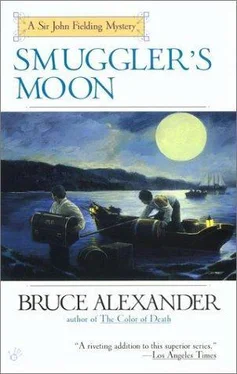Bruce Alexander - Smuggler's Moon
Здесь есть возможность читать онлайн «Bruce Alexander - Smuggler's Moon» весь текст электронной книги совершенно бесплатно (целиком полную версию без сокращений). В некоторых случаях можно слушать аудио, скачать через торрент в формате fb2 и присутствует краткое содержание. Жанр: Исторический детектив, на английском языке. Описание произведения, (предисловие) а так же отзывы посетителей доступны на портале библиотеки ЛибКат.
- Название:Smuggler's Moon
- Автор:
- Жанр:
- Год:неизвестен
- ISBN:нет данных
- Рейтинг книги:4 / 5. Голосов: 1
-
Избранное:Добавить в избранное
- Отзывы:
-
Ваша оценка:
- 80
- 1
- 2
- 3
- 4
- 5
Smuggler's Moon: краткое содержание, описание и аннотация
Предлагаем к чтению аннотацию, описание, краткое содержание или предисловие (зависит от того, что написал сам автор книги «Smuggler's Moon»). Если вы не нашли необходимую информацию о книге — напишите в комментариях, мы постараемся отыскать её.
Smuggler's Moon — читать онлайн бесплатно полную книгу (весь текст) целиком
Ниже представлен текст книги, разбитый по страницам. Система сохранения места последней прочитанной страницы, позволяет с удобством читать онлайн бесплатно книгу «Smuggler's Moon», без необходимости каждый раз заново искать на чём Вы остановились. Поставьте закладку, и сможете в любой момент перейти на страницу, на которой закончили чтение.
Интервал:
Закладка:
And then a voice: ”Coming! Coming! Who is it at the door?”
”It is Sir John Fielding, come from London,” I cried loudly that I might be heard through the door.
A bolt was thrown, a lock turned, and the door at last came open. There stood a woman of about thirty years. She was pretty enough, but panted with exertion and perspired freely from her red hair to the nape of her freckled neck (and no doubt beyond). Clearly, she had been hard at work. Was she the maid? I thought not, but in London the lady of the house would never present herself in such a state of dishevelment.
“Good gracious, it’s him, an’t it?”
Since she was not looking in my direction but beyond, I could only assume that she spoke not of me but of Sir John.
“If it is me you speak of, young lady, then allow me to present myself a bit more formally. I am Sir John Fielding, magistrate of the Bow Street Court in London, and this is my young assistant, Jeremy Proctor. We are come to call upon Mr. Albert Sarton, magistrate of Deal. Is he in?”
“Oh, he’s in, right enough, and he’s expecting you … tomorrow.”
“Well then,” said Sir John, ”perhaps we should leave and return on the day we are expected.”
“Oh no, I’ll not hear of it. Come in! Oh, do come in, please. We were just tidyin’ up the place in expectation of your visit.”
There was something quite disarming about the way she sought to make us welcome. She beckoned us inside, urging us through the door, grasping him by the arm in a way he usually fought against. She told him to mind the bump there at the threshold. Heading us forward, she left us in a small room to the left of the door with a promise to tell ”Berty” of our arrival.
“He’ll be with you before you know it.”
I guided Sir John to a chair, which he eased into rather carefully. Very likely he was still fighting the effects of last night’s wine and brandy.
We seemed to have been left in an office of some sort. The room was certainly no larger than the modest little chamber in our living quarters which Sir John called his ”study.” And it probably served Albert Sarton in the same way-providing him with a place to be alone and to think.
“Is she Irish?” Sir John asked. ”She seems Irish.”
“Well, she has red hair.”
“That’s a start.”
He was silent for a bit. ”Is she his wife?” he asked. ”What do you think?”
“I believe so,” said I, after giving the matter due consideration. ”After all, she called him ‘Berry.’ If she were a housemaid, or any sort of servant, she would not have done that.”
“True, yes, well, nobody told me that he was married.”
I wondered how that might change things, yet I did not raise the question. Instead, I looked about me and studied the objects in the room and thus attempted to draw some picture of the man we had come to see. He was plainly a man of scholarly bent. A pile of books and papers upon the desk suggested to me that he was engaged in the writing of some weighty work-on the philosophy of jurisprudence, no doubt. I half-rose and strained to see the nature of the one book which lay open upon his desk: it was a Latin dictionary. Inwardly, I shuddered, for I had a great fear that my weakness in Latin might ultimately bar my entry into the legal profession. I brooded upon this, wondering where and how I might find a tutor in Latin and why, if I put my mind to it, I could not teach myself Latin-at least well enough to pass an examination of some sort.
So completely was I taken up with my own matters that I failed to hear the footsteps down the long hall until they were nearly upon us. In fact, it was not until Sir John rose from his chair to meet the magistrate that I became aware that the latter was anywhere nearby. I jumped to my feet and made ready to be presented to him.
Albert Sarton was short of stature and short of sight. I, who am even now no more than an ordinary average in height, was then near half a head taller than Mr. Sarton. As I ducked my head sharply in a quick little bow, I found myself face to face with him; he peered at me through spectacles near a quarter inch in thickness, smiled at me in friendly fashion, and shook the hand I offered him. Indeed I liked him quite well. But once the formalities had been observed, he turned his attention to Sir John.
“Please believe me, sir,” said he to him, ”when I say that I feel quite honored to meet you. You are known far and wide.”
“Ah yes, the Blind Beak of Bow Street,” said Sir John a bit dismissively, ”-the penny papers and such.”
“By no means! Why, I recall hearing you quoted favorably at Oxford. It had to do with the problem of making the law fit the crime-something about …” He hesitated as his memory worked upon it. ”… about a villain who sold body parts taken from a murder victim …”
“Ah yes,” said Sir John, ”he was indicted on a charge of disturbing the dead.”
“Grave robbing, in effect, before the grave was dug.”
“Something like that,” said Sir John modestly.
“Oh, but please sit down, both of you.”
We resumed our places, and Mr. Sarton squeezed round us to situate himself behind the desk.
“Forgive me,” he said, ”for the mistake on the date of your arrival. I’d got a letter from the Lord Chief Justice telling me that you were on your way and that I was to cooperate with you in any and all ways which you might require. He did not name a date or a day, but said, rather, ‘in two days’ time.’ You arrived only a day later.”
“Ah well,” said Sir John, ”Lord Mansfield gave me the loan of his coach-and-four to make the trip down here. And his driver seems to go everywhere at full gallop.”
”That then was no doubt the root of the misunderstanding.
“No doubt, but dear God, Mr. Sarton, did he truly say that you were to cooperate in any and all ways which I might require?”
“Those may not have been his exact words, but they are as I remember them.”
“Then he has made it sound appallingly like a court-martial.”
Mr. Sarton stared at him for a moment, saying nothing. Then: ”Is that not the nature of your inquiry?”
Thus it came Sir John’s turn to maintain a solemn quiet. ”No sir,” said he after near a minute of cold silence, ”it is not. I have not the authority to act as a one-man tribunal in judgment upon you. I would not want such authority. I am here in answer to a complaint regarding the manner in which you have discharged your duties. I am here, to put it another way, to inquire into your methods and their effectiveness.”
“Who made this complaint? Or have I not the right to know?”
“If you expect me to reject your question as impertinent, I must disappoint you. The identity of the accuser is indeed pertinent. A man has the right to face him who sullies his name, else we are all to be in mortal dread of every manner of rumor, false witness, and he which is told of us. And so you may know that the complaint against you was made by George Eccles, Chief Customs Officer for east Kent.”
“Eccles, is it! Indeed, I should have known. He has been against me from near the start. With what, specifically, has he charged me?”
“He has said that you are either corrupt in the discharge of your office, or the most incompetent ever in the history of the magistracy.”
“But … the specifics, the incidents?”
“He gave none.” Sir John paused. ”Let me assure you,
Mr. Sarton, that Lord Mansfield, to whom the complaint was made, would not have taken Eccles’s complaint seriously but for his position; nor would he have sent me down to look into these matters had he himself not taken a personal interest in you here in Deal.”
“I … I know that he was quite instrumental in getting me this post,” said he, faltering for the first time. ”And for that I am still grateful, though a little less, perhaps, today than when I received the appointment.”
Читать дальшеИнтервал:
Закладка:
Похожие книги на «Smuggler's Moon»
Представляем Вашему вниманию похожие книги на «Smuggler's Moon» списком для выбора. Мы отобрали схожую по названию и смыслу литературу в надежде предоставить читателям больше вариантов отыскать новые, интересные, ещё непрочитанные произведения.
Обсуждение, отзывы о книге «Smuggler's Moon» и просто собственные мнения читателей. Оставьте ваши комментарии, напишите, что Вы думаете о произведении, его смысле или главных героях. Укажите что конкретно понравилось, а что нет, и почему Вы так считаете.












